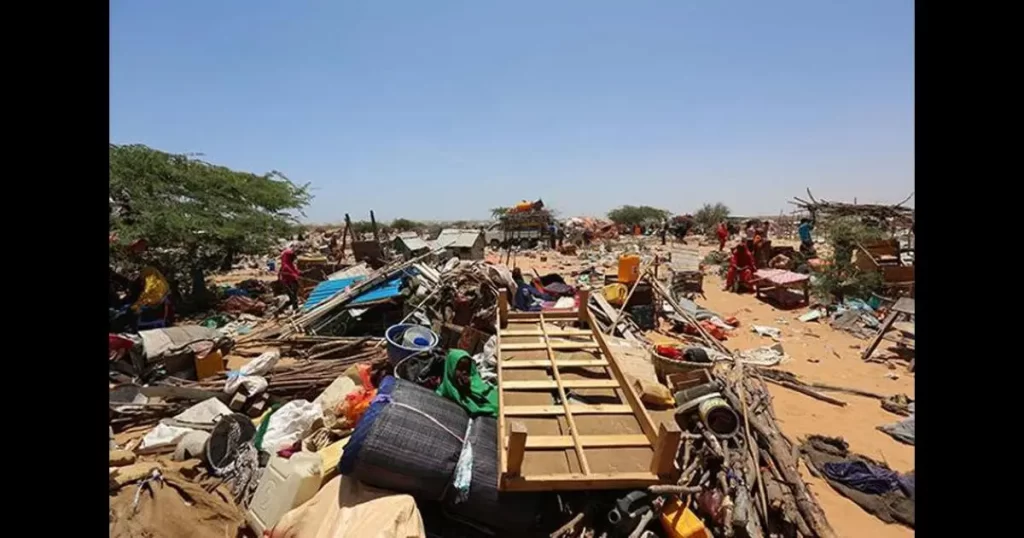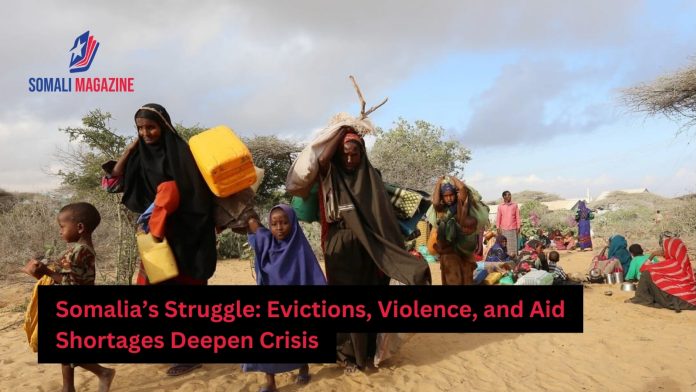Facebook Twitter Instagram Somali Magazine - People's Magazine
Somalia’s humanitarian crisis has reached alarming levels as forced evictions, escalating violence, and insufficient aid continue to exacerbate the suffering of millions, according to a recent report by humanitarian organizations. The findings paint a grim picture of a nation grappling with the compounded effects of conflict, climate change, and economic instability, leaving vulnerable populations in dire need of assistance.
The report highlights a surge in forced evictions, with over 300,000 people displaced from informal settlements in urban areas since the beginning of 2025. Many of these evictions have been carried out violently, often without prior notice, leaving families homeless and exposed to further risks. In Mogadishu alone, thousands of internally displaced persons (IDPs) have been forced out of makeshift shelters to make way for urban development projects. These evictions disproportionately affect women and children, who face heightened risks of exploitation and abuse.
Compounding the crisis is the ongoing violence perpetrated by armed groups, including Al-Shabaab, which continues to target civilians and disrupt humanitarian operations. The militant group has intensified its attacks in southern and central Somalia, forcing aid agencies to suspend critical programs in affected areas. The report notes that Al-Shabaab’s control over key regions has hindered access to food, water, and medical supplies, leaving millions at risk of starvation and disease.
The lack of adequate humanitarian aid has further worsened the situation. Despite repeated appeals for international support, funding for Somalia’s humanitarian response plan remains critically low. As of March 2025, only 40% of the required $2.6 billion has been secured, leaving a significant gap in resources needed to address the crisis. Aid agencies warn that without immediate action, the situation could deteriorate further, pushing more families into extreme poverty and hunger.
Climate change has also played a significant role in exacerbating Somalia’s humanitarian challenges. The country has experienced alternating cycles of drought and flooding, devastating agricultural production and displacing communities. The report highlights the impact of the 2024 floods, which displaced over 80,000 people and destroyed vital infrastructure, including schools and health facilities. With another drought looming, experts fear that the humanitarian needs will only grow in the coming months.

The report calls for urgent action to address the root causes of Somalia’s crisis and provide sustainable solutions for affected communities. Recommendations include strengthening legal protections for IDPs to prevent forced evictions, increasing funding for humanitarian aid, and enhancing coordination among international and local actors. The report also emphasizes the importance of addressing climate change through investments in resilient infrastructure and sustainable livelihoods.
The Somali government has acknowledged the severity of the crisis and pledged to work with international partners to address the challenges. However, critics argue that more needs to be done to ensure accountability and transparency in the distribution of aid. They also call for greater efforts to address the underlying drivers of conflict and displacement, including poverty, inequality, and weak governance.
As Somalia faces one of the worst humanitarian crises in its history, the resilience of its people remains a source of hope. Communities have come together to support one another, sharing resources and advocating for their rights. However, without sustained international support, the road to recovery will be long and arduous.
The report serves as a stark reminder of the urgent need for global solidarity and action to alleviate the suffering of millions in Somalia. As the world grapples with multiple crises, ensuring that Somalia’s humanitarian needs are not overlooked is critical to preventing further loss of life and fostering long-term stability.

